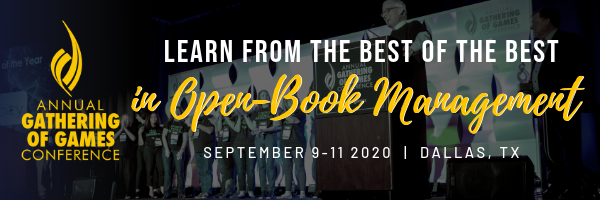
The word profit can mean many things to many people—especially in our current political climate. But for an increasing number of folks, profit has become a negative term—a dirty word—which has huge implications for the economic sustainability for businesses across the world.
At a time when company values and purpose have gone mainstream, and when even the Business Roundtable has begun prioritizing stakeholders over shareholders, the basics of what goes into making a profit has come under fire.
That’s the thorny topic Doug Tatum, a professor of entrepreneurship at Florida State University, and Bo Burlingham, the co-author with Jack Stack of The Great Game of Business and A Stake in the Outcome, tackled in a breakout session at the 2019 Gathering of Games.
As part of the discussion, Tatum shared a story from the classroom. Starting several years ago, when he was teaching business at Middle Tennessee State, he began the first class of the semester with a quiz. He showed the students two definitions of profit and then asked them to raise their hands to show which definition they thought was the correct one.
Here’s what he showed them:
Definition 1:
Profit ultimately represents the amount that a customer knowingly provides a company for the value they have received above that company’s costs.
Definition 2:
Profit ultimately represents the amount that a company receives above its cost structure to the disadvantage of its customers without their knowledge.
To his shock and surprise, Tatum found that the majority of students chose the second definition. They believed that profit was the result of companies fleecing their customers. And these were business students! Tatum has continued to poll his students in subsequent years, as well as folks he runs into at cocktail parties, and received similar results. He even co-authored a peer-reviewed article for the National Association for Business Economics titled, "Evidence on the Growing Profit Disconnect between the Public’s Views of Corporate America", where they stated that there is disconnect among many Americans over what profits really are and what they mean to a business.
As Tatum, who also wrote the book No Man’s Land, told the audience at the Gathering: “We are the most successful capitalist country in history. And yet, we have a population that misunderstands capitalism. They think profit comes from cheating people. The consequences of that belief over the long term can be terrible.”
The good news is that Tatum has been able to help turn his students around over the course of the school year by offering them an alternative definition. He defines profit as the applause your customers give you when they choose you over your competitors. It’s a result of someone voting for a business with their money. “If that’s true, isn’t the drive to create profit a noble cause?” Tatum asked.
Burlingham also offered his own definition. “Profit is the measure of the value you are delivering to your customers,” he said. “If you aren’t delivering value, someone else will. Profit isn’t just something that every business needs to survive and go on, it’s also the number that allows you to measure the amount of value you are delivering.”
Tatum and Burlingham believe that the disconnect about what profit really is comes from a lack of business education and financial literacy. Tatum shared an example about how most employees never stop to think about how expensive they are to their business—the average cost of health insurance now tops $20,000 a person, for example—and why that puts unproductive employees at risk for replacement by automation.
Of course, one of the causes for that disconnect is when companies don’t embrace transparency and teach their employees to think and act like owners—which are principles at the root of playing the Great Game of Business®.
Tatum is also working with the Great Game™ team to develop an online video learning course called Profit Sense which he hopes will help explain the basics of business in a way that anyone, even those of us who shudder at even the mention of accounting, can understand what profit really is.
The big fear Tatum and Burlingham have is that capitalism is under attack and that it’s up to businesses to better educate not just their employees but also their customers and suppliers about what’s at risk at a time when socialism has begun to return to the headlines. It’s up to business leaders to start educating their employees about the positive impacts of capitalism.
For his part, Tatum continues to use his classroom to teach his students the stakes at hand. In another experiment, he told a class that some of them were doing really well—while others were struggling with their grade. What he suggested was that the students who were studying hard, turning in their homework on time, and acing their tests—the A students—didn’t need all the points they had accumulated. He suggested that these A students should give some of their points to the students who were struggling, the C students, so that they could pull up their grades. That way everyone would get equal grades—Bs for everyone. That was fair, right?
Can you guess what happened? The A students revolted at the idea—which just might prove there is still hope for the American Dream after all.
Join us next September at the 28th Annual Gathering of Games to meet practitioners just like you and hear experiences of failures, accomplishments and lessons learned in companies of all sizes and industries.
Other articles you might like:
- Get Ready Now for the Economic Upturn in 2020
-
COCOZZA: Where One Self-Implementer Began Their Great Game Journey
-
10 Surprising Things Successful Leaders Do Differently - from the 2019 Gathering Keynote Speaker
.png)












.png)

